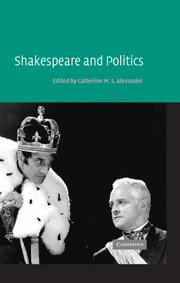Book contents
- Frontmatter
- Contents
- List of contributors
- Editor's note
- 1 Shakespeare and politics: an introduction
- 2 Shakespeare and politics
- 3 Henry VIII and the deconstruction of history
- 4 Livy, Machiavelli, and Shakespeare's Coriolanus
- 5 Richard II and the realities of power
- 6 Plutarch, insurrection, and dearth in Coriolanus
- 7 Some versions of coup d'état, rebellion, and revolution
- 8 Language, politics, and poverty in Shakespearian drama
- 9 ‘Demystifying the mystery of state’: King Lear and the world upside down
- 10 Venetian culture and the politics of Othello
- 11 The Bard and Ireland: Shakespeare's Protestantism as politics in disguise
- 12 Henry V as working-house of ideology
- 13 ‘Fashion it thus’: Julius Caesar and the politics of theatrical representation
- 14 Take me to your Leda
- 15 Macbeth on film: politics
- 16 William Shakespeare's Romeo + Juliet: everything's nice in America?
- Index
15 - Macbeth on film: politics
Published online by Cambridge University Press: 05 June 2012
- Frontmatter
- Contents
- List of contributors
- Editor's note
- 1 Shakespeare and politics: an introduction
- 2 Shakespeare and politics
- 3 Henry VIII and the deconstruction of history
- 4 Livy, Machiavelli, and Shakespeare's Coriolanus
- 5 Richard II and the realities of power
- 6 Plutarch, insurrection, and dearth in Coriolanus
- 7 Some versions of coup d'état, rebellion, and revolution
- 8 Language, politics, and poverty in Shakespearian drama
- 9 ‘Demystifying the mystery of state’: King Lear and the world upside down
- 10 Venetian culture and the politics of Othello
- 11 The Bard and Ireland: Shakespeare's Protestantism as politics in disguise
- 12 Henry V as working-house of ideology
- 13 ‘Fashion it thus’: Julius Caesar and the politics of theatrical representation
- 14 Take me to your Leda
- 15 Macbeth on film: politics
- 16 William Shakespeare's Romeo + Juliet: everything's nice in America?
- Index
Summary
Each of the three important directors – Welles, Polanski, and Kurosawa – who attempted to recreate Macbeth on the screen has had to come to terms with the play's reverence for monarchy. Despite idolatrous claims that Shakespeare was not of an age but for all time, the royal play of Macbeth unabashedly celebrates a semi-divine monarch in terms specific to the first years of Stuart absolutism. King Duncan is thoroughly paternal, compassionate, and regal. Of him even devilish Macbeth testifies that he ‘hath borne his faculties so meek, hath been / So clear in his great office, that his virtues / Will plead like angels, trumpettongu'd, against / The deep damnation of his taking-off’ (7.17–20). Macbeth's politics are cyclical, and the play cannot conclude until the pure and untaintedMalcolm, Duncan's son and the usurper's successor, invites home ‘our exil'd friends abroad / That fled the snares of watchful tyranny’ (5.9.32–3), and, invoking the ‘grace of Grace’, sets out to be invested at Scone. The play's satisfaction with the traditional order, though severely tested by the reign of the tyrant, is confirmed when a second exemplary monarch succeeds his father.
Shakespeare expands on the contentment with divine or semi-divine monarchy in two interpolated episodes. Both appear in the difficult but elegant scene in which the play temporarily escapes the witch-dominated claustrophobia of Scotland for redemptive England. In the initial passage, Malcolm first confesses to a variety of monstrous sins, then immediately reverses himself to assert his purity.
- Type
- Chapter
- Information
- Shakespeare and Politics , pp. 236 - 246Publisher: Cambridge University PressPrint publication year: 2004
- 1
- Cited by

